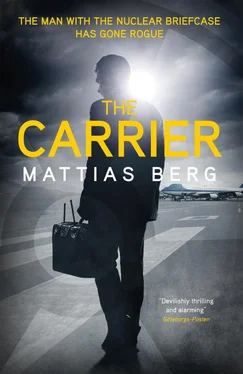Mattias Berg - The Carrier
Здесь есть возможность читать онлайн «Mattias Berg - The Carrier» весь текст электронной книги совершенно бесплатно (целиком полную версию без сокращений). В некоторых случаях можно слушать аудио, скачать через торрент в формате fb2 и присутствует краткое содержание. Город: London, Год выпуска: 2019, ISBN: 2019, Издательство: MacLehose Press, Жанр: Триллер, на английском языке. Описание произведения, (предисловие) а так же отзывы посетителей доступны на портале библиотеки ЛибКат.
- Название:The Carrier
- Автор:
- Издательство:MacLehose Press
- Жанр:
- Год:2019
- Город:London
- ISBN:978-0-85705-788-4
- Рейтинг книги:4 / 5. Голосов: 1
-
Избранное:Добавить в избранное
- Отзывы:
-
Ваша оценка:
- 80
- 1
- 2
- 3
- 4
- 5
The Carrier: краткое содержание, описание и аннотация
Предлагаем к чтению аннотацию, описание, краткое содержание или предисловие (зависит от того, что написал сам автор книги «The Carrier»). Если вы не нашли необходимую информацию о книге — напишите в комментариях, мы постараемся отыскать её.
The Carrier — читать онлайн бесплатно полную книгу (весь текст) целиком
Ниже представлен текст книги, разбитый по страницам. Система сохранения места последней прочитанной страницы, позволяет с удобством читать онлайн бесплатно книгу «The Carrier», без необходимости каждый раз заново искать на чём Вы остановились. Поставьте закладку, и сможете в любой момент перейти на страницу, на которой закончили чтение.
Интервал:
Закладка:
“Director Edelweiss will receive you now. Follow me!”
There was not really anything else we could do. Before we left the room, one of the guards cuffed his right wrist to my left and my right to Ingrid’s left—while one of the other guards was secured to Ingrid’s right. It was the classic formation. Two prisoners in the middle, one guard on either side. To break free would require a very advanced maneuver, a veritable Houdini exploit, huge raw strength and sublime timing. And with the bulky packs once more on our backs.
There were of course solutions even to this problem. The easiest one we referred to during our training as “Croquet”, where the two prisoners swung their respective guards in toward the middle. The most spectacular results came if their two heads crashed into each other.
But it was all made much more difficult by the fact that there were five other guards, the crew-cut female one in front of us and four behind, even if we managed to pull off the trick perfectly. And last but not least: each prisoner was no longer on the same side—certainly I was no longer on Ingrid’s.
The corridor was empty and cool, it felt as if we were taking a dip in the ocean after the extreme heat in the packed Interview Room. I stole a look at Ingrid next to me, her face still expressionless and impenetrable, like a mask. The female guard in front of us walked with determined steps without ever turning around. Seemed to be relying blindly on the fact that the six guards behind her would be able to keep matters under control.
I listened in the direction of the bathrooms, straining for some sort of sound—literally any sign of life—from Jesús María. But nothing could be heard and with each foot we drew further away. The wall-to-wall carpeting swallowed our footsteps. Everything was deathly quiet and ominous. Focused on something indeterminable. Entirely logical in all its lunacy. The pieces of the puzzle no longer fitted, the figures on the chessboard weren’t the right ones, even the rules of the game made no sense.
When we had reached the office—a white door with no name on it, no outward sign at all—the female guard brought our formation to a halt.
“We’re here now, Director!” she said into the minimal microphone, invisible to anyone not in the know.
There was a click from the lock and the heavy door swung open. I noted that it too had been strengthened since I was last here: seemed to have gone from a tolerance of 14.7 psi of overpressure, the only standard for the unthinkable that we had been able to imagine, to at least double that. Roughly speaking, a direct hit from a smaller nuclear weapon.
The four of us went in, Ingrid and myself chained to our escorts, while the rest of the guards—including the woman seemingly in charge—remained in the corridor. Edelweiss was sitting at his desk facing away from us, reinforcing the impact of his presence. Heavy and mysterious as a Buddha statue. And when he spun around on his chair, I could not help but catch my breath: it had been so long since I last saw him in the flesh.
His dark persona was accentuated by the surrounding whiteness. The entire office, even the floor, had been painted in the same almost floatingly light color as everything else in the sealed wing. The vast desk was made of graphite gray metal and cast in one piece. On its surface lay a single piece of paper, some sort of document, and a black fountain pen. Edelweiss spared no look for Ingrid. Just stared straight at me and the hybrid on my back, the apparatus inside. The world’s most important object.
“Welcome, my dearest Erasmus,” he said.
I did not answer. You could almost hear him licking his lips, his words slurred with saliva. The breathing as labored as ever.
Four metal chairs in the same graphite gray were lined up in front of the desk. To sit down, the four of us had to do so at exactly the same time. Yet we managed it relatively easily: we were trained to be adaptable, both as interviewers and interviewees. We were even able to put down our packs in front of the chairs, my launch mechanism and Ingrid’s portable command terminal, the full Doomsday potential. The guards, who had taken the weapons out of our packs, now laid them on the desk, beyond our reach. That too was intended to be psychologically destabilizing. So near, and yet so far.
I glanced at Ingrid on my right. She seemed indifferent to the way Edelweiss, her long-standing brother-in-arms, was treating us. He in turn still took an interest only in me. Observed me intently, seemed to be awaiting something specific. I looked past him, at the clock over the desk. It would soon be half an hour since John had taken Jesús María to the bathroom.
Then I shut my eyes and went on rehearsing scenarios. The first assumed that Edelweiss was indeed relying on me to keep my side of the bargain, meaning that he too would do as he had promised. That my family would be released or at least no longer harassed, and that I would be given safe passage, once Ingrid had been delivered to him.
The other was similar, but the other way round. It ended with Ingrid getting safe passage—having delivered me in her place. It was based on their seeing me and not her as the main protagonist in this whole piece, the Core of the Poodle. On her having somehow laid the lion’s share of the blame on my shoulders.
And the third scenario, which appeared to be the most likely, was that neither I nor Ingrid would emerge from here alive. That they would seize the opportunity to take down both of the special agents, who had so spectacularly fled from the Team and placed the future of mankind in jeopardy, at one go. Regardless of the short-term consequences. Even the President’s resignation, if it came to that, once details of our top secret formation were revealed by the media. Or the rolling out of Ingrid’s Plan B.—which could, after all, hardly be worse than her first alternative.
But all three scenarios suffered from the same weakness. None of them took sufficient account of Ingrid herself. The scope of her fantasy, her power of imagination and ability to improvise: at least equal to Edelweiss’ own.
So I was keeping a close eye on her too—trying to be vigilant in all directions at once—when Edelweiss pushed the document over the desk toward me. To make it possible for me to sign, all four of us had to stand up, like a controlled chain reaction. And not before Edelweiss handed me the pen, and I leaned forward over the paper, could I distinguish the name “INGRID OSKARSSON” in capital letters. The document was a delivery order for Alpha.
Then I felt a movement from her, a soft pull at our shared cuffs. My whole field of vision narrowed as I heard her melodic voice.
“I’m ready.”
Intense focus on the guards, the desk, our assignment, like sunlight concentrated through a magnifying glass. Moving without thinking, reflexively. I did not even need to look at Ingrid as she continued:
“Are you, Erasmus? Then let us pray.”
She had chosen the second alternative, the one we called “Prayer”. Quickly bent her guard’s right arm behind his own head and pressed him to the corner of the desk. His face slammed against the sharp-edged metal, cracking like an egg. At the same time, perfectly synchronized, I did the same to my guard on the other corner of the desk.
In an instant the rest of the guard force burst in, five of them with heavy weapons drawn, having obviously seen everything on the surveillance footage. The piercing alarm cut through my brain. I vomited onto the floor, my lifelong reaction to ultra-violence, straight onto the immaculately polished shoes of one of the dead security guards. Instantly, Ingrid raised her right hand over her head, signaling that the game was over. And my left hand, bound by the cuffs, followed it. Edelweiss was sitting stock-still, watching us with a strangely amused look on his face.
Читать дальшеИнтервал:
Закладка:
Похожие книги на «The Carrier»
Представляем Вашему вниманию похожие книги на «The Carrier» списком для выбора. Мы отобрали схожую по названию и смыслу литературу в надежде предоставить читателям больше вариантов отыскать новые, интересные, ещё непрочитанные произведения.
Обсуждение, отзывы о книге «The Carrier» и просто собственные мнения читателей. Оставьте ваши комментарии, напишите, что Вы думаете о произведении, его смысле или главных героях. Укажите что конкретно понравилось, а что нет, и почему Вы так считаете.












